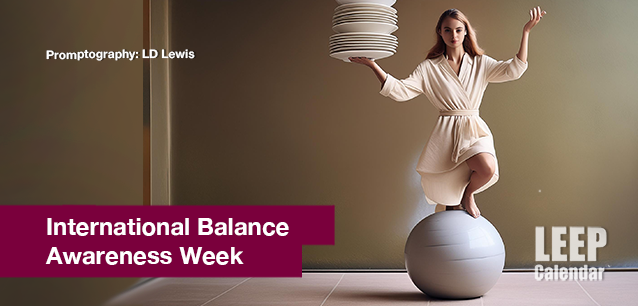 AD
AD
Today is: January 01
Scroll to explore events active on this date.
Additional Events on LEEP
LEEP INK FEATURES

August? Absolutely!
In August, we live through the Dog Days of Summer. It's hot and often humid, and those who can leave for better climates do. Down south, winter is in full force. August is also known as "the ...

In The Heat of July: July 2025 Events
Is it hot enough (or cold enough if you're below the equator) for you yet? There is actually a day for that! Like every month, I pick a diverse collection of events you may or may not know about. This ...

May Blooms: Events in May 2025
Along with October, May is one of the most densely packed months of the year. It's before the summer humidity and the last whole month of the school year. The weather is warming in t...
About International Balance Awareness Week
Seniors
Ends: Sep 24, 2024
DESCRIPTION:
BALANCE AWARENESS WEEK: HIGHLIGHTING STABILITY IN HEALTH
Each September, Balance Awareness Week is observed globally, focusing on balance's crucial role in overall health and well-being. This annual campaign, led by the Vestibular Disorders Association (VeDA), aims to increase public awareness about balance disorders and encourage early diagnosis and treatment. VeDA collaborates with healthcare providers, researchers, and patient advocacy groups to spread knowledge and support affected individuals.
The primary goal of Balance Awareness Week is to educate the public about balance disorders, their symptoms, and their impact on daily life. The campaign seeks to reduce the stigma associated with balance issues and promote resources and strategies to help individuals manage and improve their balance.
WHY BALANCE IS IMPORTANT
Balance is essential for performing everyday activities safely and effectively. It helps prevent falls, a leading cause of injury, particularly among older adults. Good balance is also crucial for maintaining mobility, independence, and overall quality of life. It involves the coordinated efforts of the vestibular system, vision, and proprioception (the sense of body position).
WARNING SIGNS OF BALANCE ISSUES
Several warning signs may indicate that someone is experiencing balance problems, including:
Dizziness or Vertigo—A sensation of spinning or moving when standing still.
Unsteadiness—Difficulty maintaining a stable position while standing or walking.
Frequent Falls—Increased incidence of tripping or falling.
Nausea or Vomiting—Often associated with vertigo or dizziness.
Blurry Vision—Trouble focusing or tracking objects, especially when moving.
Disorientation—Feeling confused or having difficulty concentrating.
HOW TO IMPROVE BALANCE
Individuals can take several steps to improve their balance and reduce the risk of falls:
Exercise Regularly—Activities such as tai chi, yoga, and balance exercises strengthen muscles and enhance coordination.
Physical Therapy—Working with a physical therapist can help address specific balance issues through targeted exercises and training.
Healthy Lifestyle—Maintaining a healthy weight, eating a balanced diet, and staying hydrated can support overall physical health and balance.
Medication Review—Consult a healthcare provider to review medications that might affect balance.
Home Modifications—Changing the living environment by removing tripping hazards and installing grab bars to enhance safety.
Balance Awareness Week plays a pivotal role in educating the public about the significance of balance and the impact of balance disorders. By highlighting the warning signs and promoting effective management strategies, the campaign aims to improve the quality of life for individuals affected by balance issues. It is possible to enhance stability and prevent falls through increased awareness and proactive measures, contributing to better overall health and well-being.
VIDEOS
SUPPORTING DOCUMENTS
Currently, this event does not have supporting documents.
ADDITIONAL IMAGES
Currently, this event does not have supporting images.
Where would you like to go now?
 AD
AD


/footer-logo.svg)
